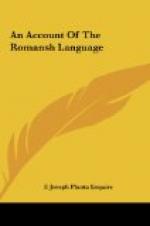The first step towards this happy revolution was made by some venerable old men dressed in the coarse grey cloth of the country, who in the year 1424 met privately in a wood near a place called Truns, in the Upper League; where, impressed with a sense of their former liberties,[AD] they determined to remonstrate against, and oppose, the violent proceedings of their oppressors. The abbot Dissentis was the first who countenanced their measures; their joint influence gradually prevailed over several of the most moderate among the nobles; and hence arose the league which, from the colour of its first promoters, was ever called the Grey League; which, from its being the first in the bold attempt to shake off the yoke of wanton tyranny, has ever since retained the pre-eminence in rank before the two other leagues; and which has even given its name to the whole country, whose inhabitants, from the circumstances of their deliverance, pride themselves in the appellation of Grisones, or the grey-ones.[AE] From this period nothing has ever affected their freedom and absolute independence, which they now enjoy in the most unlimited sense, in spite of the repeated efforts of the house of Austria to recover some degree of ascendency over them.
From this concise view of the history of the Grisons, in which I have carefully guarded against favouring any particular hypothesis, it appears, that as no foreign nation ever gained any permanent footing in the most mountainous parts of this country since the establishment of the Tuscans and Romans, the language now spoken could never have suffered any considerable alterations from extraneous mixtures of modern languages. And to those who may object, that languages like all other human institutions will, though left to themselves, be inevitably affected by the common revolutions of time, I shall observe, that a language, in which no books are written, but which is only spoken by a people chiefly devoted to arms and agriculture, and consequently not cultivated by the criticisms of men of taste and learning, is by no means exposed to the vicissitudes of those that are polished by refined nations;[AF] and that, however paradoxical it may appear, it is nevertheless true, that the degeneracy of a language is more frequently to be attributed to an extravagant refinement than to the neglect of an illiterate people, unless indeed external causes interfere. May we not hence conclude, that as the Romansh has never been used in any regular composition in writing till the sixteenth century, nor affected by any foreign invasion or intimate connexion, it is not likely to have received any material change before the period of its being written? And we have the authority of the books since printed to prove, that it is at present the identical language that was spoken two hundred years ago. These arguments will receive additional weight from the proofs I shall hereafter give of the great affinity there is between the language as it is now spoken, and the Romance that was used in France nine centuries ago.




